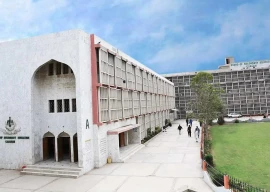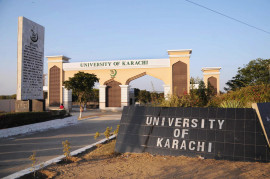
But one group of conscientious youngsters living in Wapda Christian Colony in G-7/4 has taken it upon itself to educate children who have either dropped out or have never been to school. They are also trying to clean up their neighbourhood by improving sewage, water supply and garbage management.
The group, consisting of two sisters and their cousin, is led by Sonia, an undergraduate who recently rejected a job offer paying Rs8,000 per month so she could focus on 30 children she teaches at home, free of charge.
“We are trying to equip these children with enough knowledge to go back to school. However this isn’t a sustainable way to deal with the problem and it cannot bring any long-term change in their lives,” said the 23-year-old with regret.
Crammed in a tiny room, she, along with her sister Nasreen and her cousin Shahbaz, can be seen teaching a curriculum from nursery to grade 4. Though international organisations have visited the slums and promised support, they are yet to follow up.
“Last month a delegation of Unicef came here for three days and recruited us as volunteers to administer medicine for stomach worms to children. They told us we would get financial aid and participation certificates but we are yet to hear back from them,” said Shahbaz.
Shahbaz added that Unicef had promised to conduct mosquito fumigation in the area but never delivered on that either.
However, the group said Plan Pakistan has been helping their community by enrolling women in fast track learning centres, setting up water boring systems and providing books for children.
Yet they fear that the fate of their community may become even grimmer without sustainable aid.
One fourth of Sonia’s students have never been to school. “The rest of them dropped out because their parents couldn’t afford tuition fees. When they dropped out the fee was Rs20 per month, now it is Rs150. If they couldn’t afford it then, they certainly can’t afford it now,” she added.
She also noted that even the link between education and secure employment has dwindled for them.
“There are quite a few matriculated and graduated youth in this community but all of them are either sweeping houses or are employed as labourers. There is no upward mobility for Christians living in slums, without bribery or contacts it seems impossible,” she added. Even her brother, who has a bachelor’s degree in commerce, is having difficulty finding employment.
William Parvez, a social activist, said, “Here is a group of sincere and bright youngsters who have their heart in the right place but they need a lot of guidance and training to be more effective.”
Published in The Express Tribune, August 13th, 2012.





1732947071-0/BeFunk_§_]__§-(4)1732947071-0.jpg)











COMMENTS
Comments are moderated and generally will be posted if they are on-topic and not abusive.
For more information, please see our Comments FAQ